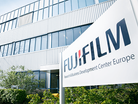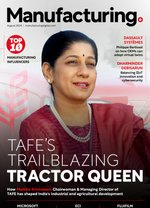Fujifilm: Spearheading Sustainable Global Manufacturing

Adapting to the ever-evolving global environment is essential for survival. Though a broad statement, its evidence is around us everywhere we turn – in nature, in individuals and in business – and adaptation often comes hand in hand with strength.
Fujifilm: A century of adaptation
Known globally for its influence on the development of film and cameras, Fujifilm was founded in 1934 based on a Japanese government plan to establish a domestic photographic film manufacturing industry.
Skip forward nearly a century and digitisation is rife. Digital cameras have caused the decline of the film industry and technology has seen the decrease of the print media that Fujifilm’s original business model was founded on. Despite this, Fujifilm remains the largest film camera company in the world. How? Because of the company's key strength – it's ability to adapt.
Today, Fujifilm has four core business areas. Imaging, including cameras, film and optical devices for industry use, reflects 16% of company revenue. The smallest of the four at 12% is Electronics – including display materials, recording media and semiconductor materials. The two largest are Healthcare at 33% – medical systems, bio CDMO, display materials, research and development and manufacturing of pharmaceuticals and functional skincare – and, at 39%, Business Innovation including multifunction devices, printers, private workspaces and graphic communications.
Founded to manufacture photographic film in Japan, Fujifilm has exploded into a group with global presence and extraordinary impact. It now employs over 70,000 people worldwide and has more than 300 group companies spanning its four key business areas.
Innovation and sustainability
Adapting to sustainability requirements and expectations has been a key consideration for companies in their evolution. No longer a nice-to-have, but a necessity.
Mutsuki Tomono, Corporate Vice President FUJIFILM Business Innovation Japan Corp., who oversees the company ESG and Reuse/Recycle Business, sums it up:
“Environmental commitment is an essential requirement to participate in global businesses now, and it's partly why we have the clear target of zero emissions by 2040.”
However, as shown in the company’s evolution, Fujifilm is not reactive to sustainability expectations – it is proactive. This has been a great aid as the company diversified into the healthcare industry, which has high expectations for partners’ sustainability measures.
“The big customers in biopharmaceutical have a clear policy – if you are not sustainable at a certain year you're out,” explains Albert Van Maaren, President & MD of FUJIFILM Manufacturing Europe B.V.
“As we now produce cell culture media for the biopharmaceutical industry, we’ve had to qualify the products to the large biopharmaceutical customers we have. They have visited our site and given very positive feedback about our steps and also they made a clear statement that if you are not sustainable, then they will search for other suppliers. In the earlier years sustainability was a nice-to-have, but now it's a must. And especially the biopharmaceutical industry, they are able to demand it, and so it is a prerequisite. That has supported and motivated our sustainability journey.”
The Fujifilm 2030 Sustainable Value Plan
Fujifilm’s key sustainability strategy is called the Fujifilm 2030 Sustainable Value Plan. Launched in 2017, it outlines the company’s efforts to contribute more to creating a sustainable society by strengthening corporate governance, environmental conservation and social contribution.
The overarching net zero goal for the company is by 2040 but, as a global group, Fujifilm has set more specific goals for different areas and geographies of the company. Fujifilm has been operating in Europe since 1966 where it now has 14 manufacturing and production sites, 46 companies and a 15.9% share of Fujifilm Holdings Corporation business.
Leading the way in sustainability is the FUJIFILM Manufacturing Europe B.V.’s centre of operations in Tilburg.
Sustainability at Tilburg
Established in the 1980s, Fujifilm’s Tilburg campus is home to FUJIFILM Manufacturing Europe B.V. and a large production facility for photo paper, membranes and cell culture media.
Amongst many things, the site is the largest producer of colour paper in the world.
“That means that two of three pictures worldwide come from this factory,” says Albert. “Other competitors have stopped producing because it is a declining market, but we want to serve the customers. We still think it's a valuable product, but we are aware it's a declining market so we have to adapt.”
Sustainability was a key consideration at Tilburg from day one, and has continued to be a heartstring of the campus.
“Sustainability at Tilburg started early – it was a strong belief for us that if you want to produce in Europe, it needs to be green” Albert shares.
“We became sustainable to contribute to a more sustainable world. But, in a more selfish way, it's the only way to survive as an emerging company, because customers realise it's important, and the European Union is really aware – it determines which companies people do business with.”
Sustainability at Tilburg is consistently evolving, staying ahead of the curve and innovating to ensure it impacts every corner of the business.
Women in manufacturing
Currently, women make up 17% of the staff at Tilburg.
Fujifilm acknowledges there is a global shortage of women working in manufacturing, and whilst it aims to be a leading employer for everyone, it has specific targets to boost equality in the Tilburg workforce.
“I think there is no longer any doubt about the decisive role of women in what we call the green revolution,” says Luana Porfido, Head of Corporate Communication and ESG Management, FUJIFILM Europe GmbH.
Fujifilm has a goal to increase the amount of women in the Tilburg workforce from 17% to 25% by 2028.
“Looking at the S of ESG, the social responsibility, we have three key pillars – corporate social responsibility, our multi-product side and clear goals for us around being a good employer,” Albert explains.
“We have clear targets on the amount of women working here and the average age to get a balanced workforce.”
Tilburg: Powered 100% by renewable wind energy
Renewable power is a pillar of many sustainability strategies, and at Tilburg this comes in the form of wind turbines.
“If Fujifilm wants to produce in Europe, then we should be on top of the list as the best location to produce in Europe and we were convinced the only way to do that is to limit the impact of the environment,” Albert says.
“How can we limit this impact? By using renewable energy.”
In 2011 five wind turbines were introduced, and at the time they contributed around 20% of the site’s energy and made up the first wind farm in the municipality of Tilburg. In 2016, the company decided to commit to 100% wind energy at Tilburg – mostly from the onsite turbines, or bought in from other wind farms if required.
“We started thinking about turbines far earlier than many others, because it was clear renewable energy was crucial to make Tilburg sustainable,” says Michiel de Hair, Manager Fujifilm Tilburg Innovation Center, part of the Strategic Program Office.
Collaborative water purification
“In 2011 we also realised that, especially in the Netherlands, we are aware of the importance of water,” Albert explains. Indeed, one of the reasons that Tilburg was chosen for the Fujifilm campus was its abundance of clean water. “We are using water in our production processes and when we have to send it to the water purification plant. And we realise if we could carefully look at the best way to treat the water, then maybe we could be the best to treat it.”
The success of the wind turbines prompted a wider look at sustainability at Tilburg, specifically at the outsourcing of water purification. Fujifilm contacted neighbouring companies and discovered that the combination of several waste streams could be treated more efficiently than the municipality would do for all the water in the area.
“So then we started to build the water purification plant with three neighbouring companies,” Albert says.
The water purification plant, operational from 2016, was another first for the area, and in fact was the first in the Netherlands. Located on Fujifilm’s premises, it is over 3,000 square metres in size and can purify 10 million litres of processed water a day.
The collaborative approach is beneficial for all the companies in many ways – as partnerships in sustainability often are. If one of the companies leaves the area or ceases business, the water purification plant survives and continues to benefit the area as the other companies remain.
Circular manufacturing: The future of sustainability
The next steps for sustainability at Tilburg are in motion, and the focus is on circularity.
“After visiting the factories of Fujifilm Business Innovation in Japan and observing the remanufacturing process, it was clear for me that this is the way to preserve a lot of scarce raw materials and to prevent waste,” says Albert.
Fujifilm have been reusing toner cartridges in Japan since the 1990s – they are disassembled, cleaned and inspected after collection. Now, thanks to a new circular manufacturing centre in Tilburg, this is the practice in Europe too.
“Other than Scope 3 emissions, our manufacturing produces the most CO2 emissions,” explained Mario Lavizzari, Project Leader ESG Europe and Deputy Head of Business Support, FUJIFILM Europe GmbH.
“Our other buildings aren’t as carbon intensive, so we are focussing on locations like Tilburg – larger manufacturing facilities with more buildings. And we’re on track to hit our sustainability targets, and are expanding sustainability initiatives.”
Fujifilm’s foundations are in adapting, and it is clear that the company is continuing to adapt both in business and sustainability strategy. After all, it has been incredibly successful so far.
******
Make sure you check out the latest edition of Manufacturing Digital and also sign up to our global conference series - Procurement & Supply Chain 2024 & Sustainability LIVE 2024
******
Manufacturing Digital is a BizClik brand.
- Lenovo & Saudi Alat Building Green Manufacturing FacilitySustainability & ESG
- FUJIFILM Diosynth Biotechnologies Expands in DenmarkProduction & Operations
- How Consumer Goods Manufacturers Are Tackling Scope 3Sustainability & ESG
- Creating a 'Greener' Approach to Christmas Tree ProductionSustainability & ESG


